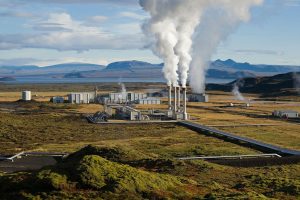Will the price drop in the Oil Industry allow Geothermal to flourish
By Emily Folk
 The prospect of geothermal energy has been heating up within the last few years, but even more so lately. As the oil industry struggles to stay afloat in the midst of the coronavirus pandemic, geothermal offers a suitable alternative.
The prospect of geothermal energy has been heating up within the last few years, but even more so lately. As the oil industry struggles to stay afloat in the midst of the coronavirus pandemic, geothermal offers a suitable alternative.
Why Go Geothermal?
Without considering cost or assessing risks, geothermal seems like the perfect renewable energy. Unlike solar and wind energy, geothermal can supply baseload power and heat. Plus, it uses infrastructure similar to that of natural gas extraction.
As more of these structures close, geothermal offers a promising off-ramp for those working in the oil and gas industry as the world transitions to green power. Plus, British Columbia, Yukon and Alberta have some of the highest geothermal temperatures, making them prime locations.
If there are so many positives to geothermal, why hasn’t North America implemented it on a large scale yet? As of last summer, there were more than 100,000 installations across Canada. However, these draw upon shallow geothermal sources and account for less than 4% of the country’s energy usage. One reason for this underutilization of geothermal may be the high cost of digging, drilling and installing systems.
On a residential level, labor alone could cost $10,000 to $20,000 per system. On a commercial scale, geothermal is obviously more expensive, especially in upfront costs. Additionally, the long project times and payback periods make it a rather risky investment. However, there has been more interest in geothermal recently, resulting in some government funding and even startup funding from gas and oil companies.
Is Now the Right Time?
Is now the right time for geothermal to flourish? Most people are aware society is draining the Earth of its gas and oil stores. In fact, experts predict we will run out of these nonrenewable resources before the turn of the next century. However, the world may stop using fossil fuels long before then if gas and oil companies continue to struggle like they are currently. Subsequently, humans may have no other choice but to switch to renewables like geothermal.
While the state of the oil industry presents a prime opportunity to make this switch, the pandemic and subsequent economic downturn have made doing so nearly impossible. Plus, natural gas and electric prices are lower right now, thereby incentivizing their use. Good market conditions are necessary for geothermal energy growth. Therefore, the government will likely push large-scale projects off the agenda for now.
Rethinking the Energy Mix
Instead of focusing on clean energy and reducing carbon footprints, national governments will likely shift gears to address more pressing recent events. Undoubtedly, surviving the coming recession at all costs will take the front seat in government discussion and the minds of North Americans. Of course, this will leave them rethinking the energy mix when it finally comes time to shift attention back to green energy.
In the short term, Canada and the U.S. will likely focus on building the oil economy back up so that it's stable. In the long term, though, they'll also need to begin actively planning a transition out of oil and fossil fuels. Obviously, rebuilding the economy so that it might support costly geothermal projects is the first step. However, active planning will involve mapping drilling locations, budgeting and other logistical considerations.
The good news is geothermal system construction is not coming to a halt, even in the current crisis. Of course, progress is and will inevitably remain slow until the economy recovers, but many initiatives are still drilling, building and investing in geothermal. For instance, some developers are building and installing geothermal systems in new condos in Toronto. Others continue to secure government funding for larger geothermal projects.
In this way, renewables will continue to gain momentum, eventually leading to more widespread geothermal energy growth. Despite some rather debilitating hiccups in the economy, renewables are still a promising opportunity — one that North America would be wise to give more thought to sooner rather than later.
 Emily Folk is a conservation and sustainability writer and the editor of Conservation Folks.
Emily Folk is a conservation and sustainability writer and the editor of Conservation Folks.



